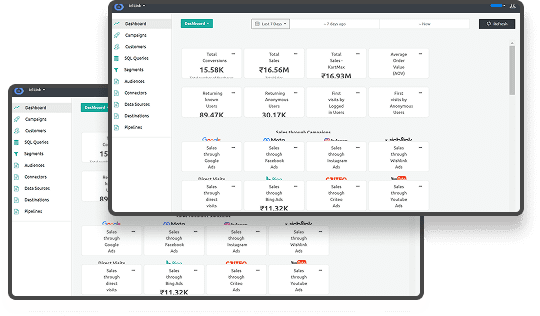You’ve invested time and money into multiple marketing channels, but how do you know which ones are driving results?
Figuring out which marketing efforts are truly effective is more important than ever. Attribution technology gives you the power to track and analyze the performance of your campaigns across various platforms. Accurately attributing conversions helps you allocate resources effectively for optimal outcomes.
Understanding the customer journey is crucial, especially in a cookieless world where traditional tracking methods are becoming less reliable. Attribution technology not only helps you identify the most effective channels but also ensures compliance with data privacy regulations like GDPR and CCPA.
Whether you're managing server-side tagging or exploring first-party data solutions, having the right attribution tools can significantly enhance your marketing strategy and drive sustainable growth.
By the end of this article, you'll have a clear understanding of which attribution technologies can best meet your business needs and how to implement them effectively.
Let’s first learn about marketing attribution and its importance.
What is Marketing Attribution?
Marketing attribution is identifying and assigning credit to the various touchpoints and channels that contribute to a customer's decision to convert. In simpler terms, it answers the question: "Which marketing efforts are driving sales and conversions?" Understanding attribution helps marketers allocate their budgets more effectively, optimize campaigns, and ultimately increase their return on investment (ROI).
Attribution technology provides the tools necessary to track and analyze these customer interactions across various touchpoints. By accurately attributing conversions to their respective sources, you gain valuable insights into your marketing performance. This clarity allows you to:
- Optimize Marketing Strategies: Focus your efforts on channels that yield the highest ROI.
- Improve Budget Allocation: Allocate your marketing budget more efficiently by investing in high-performing channels.
- Enhance Customer Understanding: Gain a deeper understanding of your customers' journeys, preferences, and behaviors.
- Ensure Data Privacy Compliance: Modern attribution tools, like those offered by Ingest Labs, ensure that your data collection practices comply with regulations such as GDPR and CCPA, maintaining trust and transparency with your audience.
For a comprehensive overview of how first-party data solutions can enhance your marketing strategies, check out our related article.
Next, let’s move on to types of marketing attribution models.
Types of Marketing Attribution Models
Selecting a suitable attribution model is crucial for accurately measuring the effectiveness of your marketing efforts.
1. Single-Touch Attribution
Single-touch attribution assigns all the credit for a conversion to a single touchpoint in the customer journey. This model is straightforward and easy to implement, making it a popular choice for businesses new to attribution.
- First-Touch Attribution: This model gives all the credit to the first interaction a customer has with your brand. It's useful for understanding which channels are effective at generating initial awareness.
- Last-Touch Attribution: Conversely, last-touch attribution assigns all the credit to the final interaction before conversion. This is helpful for identifying which channels are most effective at closing deals.
2. Multi-Touch Attribution
Multi-touch attribution distributes credit across multiple touchpoints in the customer journey, providing a more comprehensive view of how different channels contribute to conversions. This model acknowledges that customers often interact with multiple marketing channels before making a purchase.
- Linear Attribution: This model distributes credit evenly across all touchpoints. It offers a balanced view of all channels involved in the conversion process.
- Time-Decay Attribution: Time-decay attribution assigns more credit to touchpoints that occur closer to the conversion. This is beneficial for campaigns where recent interactions are more influential.
- Position-Based Attribution: Also known as U-shaped attribution, this model allocates 40% of the credit to the first and last touch points each, and the remaining 20% is distributed among the middle interactions. It highlights both acquisition and conversion channels.
Check out our article on Understanding Multi-Touch vs. Last-Touch Attribution for a deeper dive into multi-touch attribution.
3. Marketing Mix Modeling (MMM)
Marketing Mix Modeling is a statistical analysis technique used to estimate the impact of various marketing tactics on sales and other key performance indicators (KPIs). Unlike other attribution models that focus on digital touchpoints, MMM takes into account both online and offline channels, providing a comprehensive view of all marketing activities.
- Data Integration: MMM integrates data from multiple sources, including TV, radio, print, digital advertising, and in-store promotions, to understand their combined effect on sales.
- Predictive Insights: By analyzing historical data, MMM can predict future sales trends and help marketers allocate budgets more effectively across different channels.
While Marketing Mix Modeling is highly effective, it demands a robust attribution technology to handle the complexity and volume of data involved.
Understanding these models is essential for selecting the right attribution technology that aligns with your business goals and marketing strategies.
What are the benefits of marketing attribution? Let’s have a look at it.
Benefits of Marketing Attribution Tools
Implementing the right attribution technology offers numerous advantages that can significantly enhance your marketing efforts. Here are some key benefits you can expect:
1. Improved ROI:
- One of the most significant benefits of attribution technology is the ability to improve your return on investment (ROI).
- By accurately identifying which marketing channels and campaigns are driving conversions, you can allocate your budget more effectively.
- This ensures that your marketing spend is directed towards the most profitable channels, maximizing your overall ROI.
2. Enhanced Decision Making:
- With comprehensive data insights provided by attribution technology, you can make more informed decisions about your marketing strategies.
- Understanding which channels perform best allows you to optimize your campaigns, discontinue ineffective strategies, and focus on initiatives that yield the highest returns.
- This data-driven approach leads to smarter marketing decisions and better outcomes.
3. Better Customer Insights:
- Attribution technology offers a deeper understanding of customer behavior and preferences.
- By tracking and analyzing customer interactions across multiple touchpoints, you gain valuable insights into what drives your audience to convert.
- This knowledge enables you to tailor your marketing efforts more precisely, creating personalized experiences that resonate with your customers.
4. Optimized Marketing Strategies:
- Knowing which channels and touchpoints are most effective allows you to refine and optimize your marketing strategies.
- Attribution technology helps you identify the strengths and weaknesses of your campaigns, enabling you to adjust your tactics for better performance.
- This continuous optimization leads to more efficient and effective marketing efforts.
5. Compliance with Data Privacy Regulations:
- Ensuring compliance with data privacy laws like GDPR and CCPA is crucial.
- Ingest Labs are built with data privacy features that help you stay compliant.
- This not only protects your business from potential fines but also builds trust and transparency with your audience. Learn more about what you need to know about consent management.
6. Seamless Integration
- Advanced attribution technologies seamlessly integrate with a variety of marketing platforms and tools.
- This ensures that your data flows smoothly across different systems, simplifying your workflow and enhancing data management.
- With server-side tagging solutions and proactive tag error monitoring, you can maintain a cohesive and efficient marketing infrastructure.
Now that we've explored the numerous benefits of using attribution technology, let's delve into the top marketing attribution tools..
Popular Marketing Attribution Tools
Marketing attribution tools can enhance future marketing campaigns and budget allocation. Each platform offers distinct features, functionalities, and advantages. Let’s examine these as we review the leading marketing attribution tools and software.
- Ingest IQ
- Ingest IQ by Ingest Labs is designed to efficiently collect, process, and integrate data from various sources.
- Key Features:
- Data Integration: Ingest IQ seamlessly connects data from multiple sources—whether it’s from social media, customer databases, or website analytics.
- Real-time analytics: Ingest IQ offers real-time data insights, allowing you to monitor changes as they happen.
- Advanced visitor journey Tracking: Understanding customer behavior is essential for crafting effective marketing campaigns, and Ingest IQ’s advanced visitor journey tracking gives you the tools to do just that.
- Google Analytics 4 (GA4)
- Google Analytics 4 is Google's latest analytics platform, offering enhanced tracking and attribution capabilities tailored for the modern marketer.
- Key Features:
- Advanced Event Tracking: Captures detailed interactions across your website and apps.
- Machine Learning Insights: Utilizes AI to provide predictive metrics and identify trends.
- Cross-Platform Tracking: Offers a unified view of user interactions across multiple devices and platforms.
- Seamless Integration with Google Products: Easily connects with Google Ads, Google Tag Manager, and other Google services.
- Adobe Analytics
- Adobe Analytics is a data collection and analysis tool designed for enterprise-level businesses seeking detailed insights into their marketing performance.
- Key Features:
- Real-Time Data Processing: Delivers instant data analysis and reporting.
- Predictive Analytics: Uses AI to forecast future trends and behaviors.
- Customizable Dashboards: Allows for tailored views of your key metrics and KPIs.
- Deep Integration with Adobe Marketing Tools: Enhances the functionality of Adobe Experience Cloud and other Adobe products.
- HubSpot Marketing Hub
- HubSpot Marketing Hub offers a comprehensive marketing platform with built-in attribution modeling, making it a favorite among inbound marketers.
- Key Features:
- Multi-Touch Attribution: Assigns credit across multiple touchpoints to provide a holistic view of marketing performance.
- Lead Tracking: Monitors the journey of leads from initial contact to conversion.
- Campaign Management: Streamlines the creation, execution, and analysis of marketing campaigns.
- Seamless Integration with CRM: Connects marketing efforts directly with sales data for unified insights
Now that we know all the popular attribution tools in the market. Let’s learn how to choose the right tool for your business.
Choosing the Right Attribution Tool
Selecting the right attribution technology can significantly affect how you understand and optimize your marketing efforts. Here’s a simple guide to help you choose the best tool for your needs:
1. Define Your Marketing Attribution Goals and Requirements
Start by clearly outlining what you want to achieve with attribution technology.
- Identify Your Objectives: Do you want to improve ROI, understand customer journeys, optimize specific marketing channels, or ensure data privacy compliance?
- Set Clear KPIs: Establish key performance indicators such as conversion rates, customer acquisition costs, and lifetime value to measure the effectiveness of your attribution tool.
- Understand Your Customer Journey: Analyze how customers interact with your brand across different touchpoints to identify the features you need in an attribution tool.
Defining your goals helps you focus on the tools that align best with your business objectives, ensuring you get the most out of your attribution technology.
For a deeper understanding of customer interactions, refer to our article on Understanding and Optimizing Conversion Funnels in Digital Marketing.
2. Integration Options and Data Coverage
Your attribution tool should seamlessly fit into your existing marketing ecosystem.
- Seamless Integration: Ensure the tool can connect with your current marketing platforms, CRM systems, and data warehouses. Tools like Ingest Labs offer extensive integration capabilities, making it easier to unify your data and streamline your marketing efforts.
- Data Coverage: Check if the tool covers all the channels and touchpoints relevant to your business. Comprehensive data coverage ensures you capture every interaction that contributes to conversions.
- Pre-Built Integrations: Look for tools that offer pre-built integrations with popular platforms such as Meta CAPI, TikTok Events API, and Google Measurement API. This can significantly reduce the time and effort required for setup and maintenance.
A tool that integrates smoothly with your existing systems ensures that your data flows effortlessly, providing a comprehensive view of your marketing performance without unnecessary complications.
For insights on enhancing your tag management practices, visit How to Stay Ahead of Tag Errors with Proactive Monitoring.
3. Evaluate User-Friendliness and Support
The ease of use and the quality of support can greatly impact your experience with an attribution tool.
- User-Friendly Interface: Choose a tool with an intuitive and easy-to-navigate interface. This ensures your marketing team can manage tags, track data, and analyze performance without needing extensive technical knowledge.
- Comprehensive Reporting: Look for tools that offer detailed and customizable reporting features. The ability to generate clear and actionable reports is vital for deriving insights and making informed decisions.
- Customer Support: Reliable customer support resources are crucial for overcoming any challenges you might encounter. Ensure the tool provides access to knowledgeable support teams and documentation to help your team make the most of the platform.
- Scalability: Consider whether the tool can grow with your business. A scalable attribution tool will handle increasing data volumes and expanding marketing channels without compromising performance.
Here are the key features to consider when evaluating attribution tools:
- Multi-Touch Attribution
- The attribution tool should support multi-touch attribution, allowing you to assign credit to multiple touchpoints in the customer journey.
- This feature provides a view of how different channels interact and contribute to conversions, enabling you to understand the complete customer experience.
- Real-Time Analytics
- Real-time analytics are crucial for making timely and informed decisions.
- Look for attribution tools that offer real-time data processing and reporting, so you can monitor your campaigns' performance as they happen and adjust your strategies accordingly.
- Integration Capabilities
- Seamless integration with your existing marketing platforms and tools is a must. Ensure that the attribution tool can connect with your Meta CAPI, TikTok Events API, and Google Measurement API to provide a unified data flow across all your marketing channels.
- Data Privacy and Compliance
- Data privacy is paramount in today's marketing environment. Choose attribution tools that offer robust data privacy features to ensure compliance with regulations like GDPR and CCPA.
- This not only protects your business but also helps maintain trust with your customers. Explore our insights on ethical data collection for more information.
- Customizable Attribution Models
- Every business has unique marketing strategies and customer journeys. Look for attribution tools that allow you to customize attribution models to fit your specific needs.
- This flexibility ensures that the tool aligns with your business goals and provides the most accurate insights.
- User-Friendly Interface
- A user-friendly interface is essential for the efficient use of attribution technology.
- The tool should be intuitive and easy to navigate, allowing your team to manage tags, track data, and analyze performance without requiring extensive technical knowledge.
A user-friendly tool with solid support helps your team use attribution technology effectively, maximizing benefits without technical issues.
For more on integrating your attribution technology, check out our guide on Server-Side Tagging: Why It's Time to Shift the Game.
So, why exactly should Ingest Labs be your go-to choice for advanced attribution technology?
Why Choose Ingest Labs for Attribution Technology
When it comes to selecting the right attribution technology, Ingest Labs offers a suite of features tailored to meet the demands of modern digital marketers. Here’s why Ingest Labs should be at the top of your list:
1. Server-Side Tagging
Ingest Labs specializes in server-side tagging, a powerful feature that shifts the tagging process from the client to the server.
2. Data Privacy and Compliance
Data privacy is a top priority in today’s digital landscape. Ingest Labs is built with robust data privacy tools that ensure your data collection practices comply with global regulations like GDPR, CCPA, and LGPD.
3. Seamless Integration Capabilities
Ingest Labs offers over 100 pre-built integrations, making it easy to connect with a wide range of marketing tools and platforms. Whether you’re using Meta CAPI, TikTok Events API, or Google Measurement API, Ingest Labs ensures seamless data flow across all your marketing channels.
4. Real-Time Data Streaming
With Ingest Labs’ real-time data streaming, you can access up-to-the-minute insights into your marketing performance.
5. Visitor Journey Tracking
Ingest Labs provides comprehensive visitor journey tracking, allowing you to map out and analyze every interaction your customers have with your brand across multiple channels.
With advanced features, seamless integrations, and a strong focus on data privacy, Ingest Labs empowers you to make data-driven decisions that enhance your marketing performance and drive higher ROI.
Conclusion
Understanding attribution technology is essential for any business looking to optimize its marketing efforts and maximize returns. By accurately tracking which channels and campaigns drive conversions, you can make informed decisions, allocate your budget more effectively, and enhance overall marketing performance. Without proper attribution, there's a risk of investing in ineffective strategies while overlooking the ones that truly make a difference.
Ingest Labs is a top choice in attribution technology, offering advanced server-side tagging, comprehensive data privacy features, and seamless integration capabilities. Our platform helps you pinpoint the most effective marketing channels and ensures compliance with data privacy regulations like GDPR and CCPA.
Ready to elevate your marketing strategy and achieve higher ROI? Contact us today to learn how Ingest Labs can transform your approach to data-driven marketing and help you make smarter, more effective marketing decisions.






